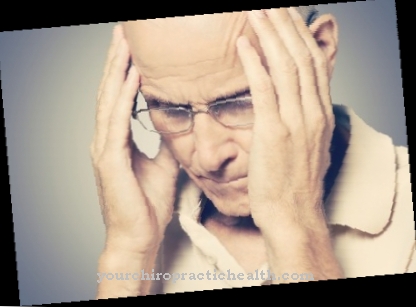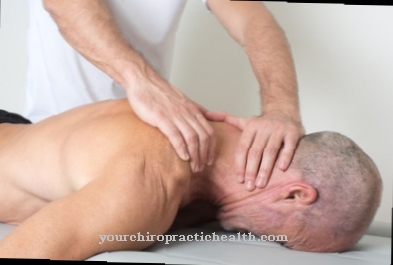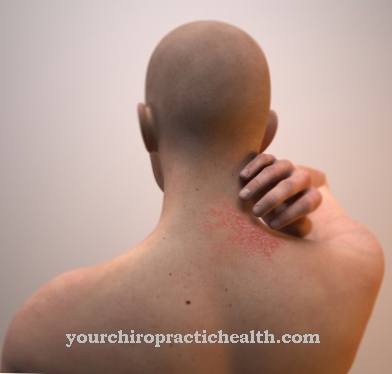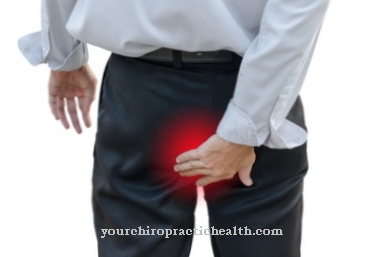Drowsiness is the easiest form of quantitative disturbance of consciousness. Often the name is confused with dizziness. Those affected are sleepy. The state of drowsiness can also occur on waking up, under hypnosis, meditation and relaxation exercises.
What is drowsiness?

Doctors understand drowsiness to be a quantitative disturbance of consciousness. This means that the patient's level of alertness is limited. In connection with drowsiness, disturbances in thinking, acting and concentration disorders can occur.
Attention is diminished. The patients are approachable and react spontaneously to being spoken to. If drowsiness occurs, this indicates a mental disorder with an organic cause.
causes
The causes of the Drowsiness are mostly of organic origin and require a doctor's examination if they occur more frequently.
The causes of drowsiness include fluid loss, medication, drugs, alcohol, and poisoning. Metabolic disorders (diabetes) and environmental toxins can also lead to drowsiness. Brain disorders or injuries can also be responsible for drowsiness.
Patients also often experience drowsiness after a stroke. Acute heart problems e.g. Heart attacks can cause drowsiness. Another cause can be meningitis or encephalitis caused by a tick bite. Drowsiness can also occur after a sunstroke. Blockages in the upper cervical spine rarely cause drowsiness.
You can find your medication here
➔ Medicines against impaired consciousness and memory problemsDiseases with this symptom
- Aneurysm
- Drug allergy
- Brain edema
- Heart attack
- Circulatory disorders
- Alcohol intoxication
- heatstroke
- Sunstroke
- concussion
- stroke
- Diabetes mellitus
- poisoning
- Meningitis
- Mushroom poisoning
- Metabolic disorder
- epilepsy
- Hypotension
- Hypoglycaemia
Diagnosis & course
When diagnosing for Drowsiness it must be clearly defined whether it is a quantitative disorder of consciousness or a vertigo attack. In addition, the doctor will examine whether the patient reacts appropriately to speech and pain stimuli. The doctor tests the extension and flexion reflexes. They give the doctor information about the severity of the quantitative disturbance of consciousness.
The course of drowsiness depends on the cause and the therapy. If the cause can be eliminated, the drowsiness will go away. If no adequate therapy is used, somnolence (pathological sleepiness), sopor, precoma or coma can occur. In the case of pathological sleepiness, the patient can only be aroused by speaking loudly or by touching them. Breathing is also slowed here.
Sopor is characterized by the fact that the patient can only be woken up briefly by strong wake-up stimuli. In the pre-coma and coma, the patient can no longer be awakened. Here, the differentiation takes place through the pupillary reflex to incident light, which is still present in the pre-coma, and no longer in the coma. In addition, breathing is slowed down or breathing pauses occur.
Complications
Drowsiness affects the ability to properly assess everyday situations and make sensible decisions. For their own safety, for example, after anesthesia or under the influence of certain medications, patients are asked not to operate heavy machinery or to participate in road traffic. Otherwise, drowsiness can lead to serious accidents in these situations.
In the household, affected patients should also be careful if they are drowsy and not touch any sharp objects, do not cook anything themselves and only move slowly and carefully until the drowsiness has improved. Complications from drowsiness often arise from the fact that the patient is at home under medication, but has no companion with him to help him in this condition. If, on the other hand, the drowsiness is not drug-induced, but occurs unpredictably, it is often downplayed by the person concerned and not properly recognized by those around him.
The onset of drowsiness usually develops so slowly that the person concerned is not sure what is happening to him or her and whether there is a problem at all. If it occurs due to nerve damage, for example, the person concerned continues to live his everyday life despite being drowsy and exposes himself and others to various risks. As a result, it is not uncommon for the patient to be admitted to the hospital as an accident patient and to indicate there that he has been feeling drowsy all day and probably should not have left the house at all.
When should you go to the doctor?
Frequent drowsiness should always be questioned carefully. Going to the doctor gives you certainty about the cause. If the drowsiness becomes stronger or faints, the person concerned definitely belongs in the hands of a specialist. Either the partner calls the emergency doctor or the patient activates the emergency call immediately after waking up.
Sometimes people are light-headed and dizzy from kneeling down and getting up too quickly. Both usually pass quickly, and a doctor's visit is not necessary. If the feeling of not being completely with oneself persists, or if it occurs again and again for no apparent cause, things will look different.
If the fever is high, drowsiness also occurs. It should be noted that children often have a relatively cool forehead despite the increased temperature. The clinical thermometer is indispensable here; the (often hot) stomach can also be felt for control. When children (and old people) drink too little, they are also often drowsy.
The first point of contact is usually your family doctor. An internist can also be interviewed. Drowsiness may also be an issue for the orthopedic surgeon if the brain is no longer properly supplied due to clamped blood vessels. This is often due to severe tension and poor posture.
Doctors & therapists in your area
Treatment & Therapy
The therapy of drowsiness should be done very quickly and depends on the cause.
If the cause is a circulatory disorder, then blood circulation-enhancing therapy is required. If the drowsiness occurs due to toxic substances, these must be discontinued or removed. Alcohol or drug withdrawal should be mentioned here as examples.
Drowsiness due to metabolic imbalances can only be treated by properly controlling blood sugar levels. If infectious diseases are the cause of the drowsiness, the therapy is carried out with suitable drugs, which are administered orally and by infusions.
The drowsiness caused by increased intracranial pressure requires the intervention of a neurosurgeon, who lowers the intracranial pressure through surgical measures. If heart disease is responsible for the drowsiness, further therapy should be given by a cardiologist, who tries to normalize the function of the heart again through drug or surgical therapy.
If the drowsiness is the result of a blockage in the cervical spine, the patient should definitely consult an orthopedic surgeon or a physiotherapist who will use certain mobilization techniques to remove the blockage.
Outlook & forecast
Drowsiness does not necessarily have to be treated by a doctor. It can appear temporarily in many people and also disappear again itself, so that no special treatment is necessary. The success in treating drowsiness depends very much on the psychological and physical characteristics of the patient and cannot be predicted individually.
Relatively often there is a delayed reaction to the environment. This can lead to severe restrictions in everyday life. It is no longer possible to carry out an activity for many people who are drowsy. In many cases, the drowsiness arises in the course of the aging process and cannot be completely prevented.
Drowsiness can also occur at a young age as a result of an accident or another mental disorder and can put a heavy strain on the person's life. A cure is only possible in a few cases. Most of the time, the patient is dependent on outside help and care in order to cope with everyday life.
Often those affected are treated with medication that is supposed to prevent traumatic brain injury. This is often responsible for the drowsiness itself. In addition to drowsiness, sleep problems and metabolic problems usually occur, which are aggravated by the use of alcohol and other drugs.
Whether the drowsiness can be completely cured depends heavily on the general condition of the patient.
You can find your medication here
➔ Medicines against impaired consciousness and memory problemsprevention
Through a healthy lifestyle with sufficient and varied exercise and the correct adjustment of the blood sugar level, disturbances that go hand in hand with drowsiness can be partially avoided. Furthermore, alcohol should not be consumed at all or only in small amounts.
Substance abuse causes further harm in addition to drowsiness, and should be avoided. When doing handicrafts or building houses, toxic substances should be avoided, as these toxins are constantly being released into the air in the room. In addition, long periods of standing in certain positions should be avoided in order to prevent the cervical spine from becoming blocked.
You can do that yourself
Drowsiness is a widespread symptom which can indicate various clinical pictures. Often times, drowsiness is accompanied by a lack of fluids, so drinking plenty of cold water can help. The blood circulation is stimulated and the nutrients in the body are processed better. If there is sufficient fluid supply, a cold shower can promote blood circulation and counteract the feeling of drowsiness.
In general, attention should be paid to the correct sitting posture. The shoulder and neck muscles are relaxed in an upright posture. In the case of predominantly sedentary activities, loosening up and relaxation exercises should be performed at regular intervals, which promote blood circulation and keep the body active through movement. Regular exercise is also suitable to reduce feelings of drowsiness and to avoid it in advance.
Stress can also be a contributing factor to drowsiness. After a strenuous day at work, it is not absolutely necessary to do housework after work. The body and mind need sufficient time to relax. Additional, often self-made, stress should be avoided. This also goes hand in hand with a healthy sleep rhythm. An adult needs an average of 8 hours of sleep.
If the drowsiness is accompanied by depression, it is advisable to spend enough time outdoors. Sun and fresh air stimulate the metabolism and increase vitamin D intake.



























